Table of Contents
Welcome to the intricate realm of event app development, where lines of code and user experiences intertwine to create seamless platforms for unforgettable gatherings.
Picture this: a symphony of algorithms orchestrating ticket sales, real-time updates, and attendee engagement.
In this blog, we’ll dissect the anatomy of event apps, drawing inspiration from industry trailblazers like Eventbrite.
So, buckle up as we unravel the complexities behind crafting a cutting-edge event app that’s poised to redefine event management in the digital age. Let’s get right into it:
Introduction To Eventbrite
Eventbrite offers you a seamless way to discover, create, and manage events of all sizes, from local workshops to global conferences.
Founded in 2006 by Kevin Hartz, Julia Hartz, and Renaud Visage, the platform’s journey began with a vision to revolutionize event management and ticketing.
With Eventbrite, you can effortlessly explore a diverse range of events, purchase tickets, and even create your own events with just a few clicks.
Eventbrite’s success story is inspiring.
Starting from humble beginnings, the platform rapidly gained traction due to its user-friendly interface, robust features, and its ability to empower event organizers, both individuals and businesses.
Moreover, the company’s commitment to providing a seamless experience for event attendees and organizers alike led to its rapid growth.
Over the years, Eventbrite expanded its reach globally, becoming a household name in event management. And its innovative technology and user-focused approach brought a disruptive change to the industry, replacing traditional ticketing methods with digital solutions.
Furthermore, this shift not only streamlined the ticketing process but also helped organizers reach a broader audience.
The company’s success can be attributed to its dedication to customer satisfaction, continuous innovation, and adaptability to changing market trends. By staying ahead of the curve and introducing features like mobile ticketing and social media integration, Eventbrite maintained its position as a market leader.
Today, Eventbrite stands as a testament to the power of a simple idea backed by relentless determination.
Its user-centric platform continues to connect people through events, enriching lives and fostering a sense of community worldwide.
The journey from a startup to a global event management powerhouse showcases Eventbrite’s unwavering commitment to transforming the way we experience and organize events.
How Does Eventbrite Make Money?
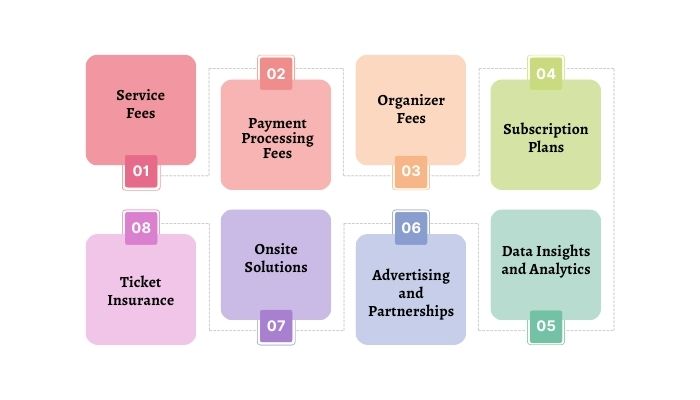
Eventbrite generates revenue through various avenues to sustain its platform and services. As an event-goer, you might not see this side, but here’s how they do it:
· Service Fees
When you purchase a ticket for an event through Eventbrite, you’re charged a service fee.
This fee covers the convenience of using the platform, secure payment processing, and customer support services.
Moreover, the fee amount varies based on the event ticket price and type.
· Payment Processing Fees
Eventbrite charges payment processing fees for each transaction.
These fees cover the costs associated with securely processing the payment for your ticket. The amount is typically a percentage of the ticket price plus a fixed fee.
· Organizer Fees
Event organizers who use Eventbrite to create and manage events often opt for premium features and services, such as event promotion tools, custom branding, and more advanced analytics.
Furthermore, eventbrite offers various subscription tiers with corresponding fees to cater to different organizer needs.
· Subscription Plans
Eventbrite offers subscription plans for event organizers who frequently host events.
In addition, these plans provide additional features and tools to enhance event management, such as marketing support, ticket sales analytics, and integration options.
· Ticket Insurance
Some events offer ticket insurance, allowing attendees to get a refund in case they can’t attend the event due to unforeseen circumstances.
And eventbrite collaborates with insurance providers and earns a commission on each insurance policy sold.
· Onsite Solutions
For larger events, Eventbrite provides onsite solutions like entry management tools, RFID wristbands, and mobile apps to streamline the check-in process.
These solutions come at an additional cost for organizers.
· Advertising and Partnerships
Eventbrite collaborates with sponsors and partners to promote events and reach a wider audience.
These partnerships can involve advertising placements or sponsored event listings, generating revenue for Eventbrite.
· Data Insights and Analytics
Eventbrite offers event organizers valuable insights and analytics about their attendees’ behavior and preferences.
This data can help organizers refine their events and marketing strategies. Organizers might pay for advanced analytics packages.
In essence, Eventbrite employs a mix of transactional fees, subscription models, premium features, and strategic partnerships to generate revenue while providing event-goers and organizers with a user-friendly platform to discover, manage, and attend events.
Features of Eventbrite – Event App
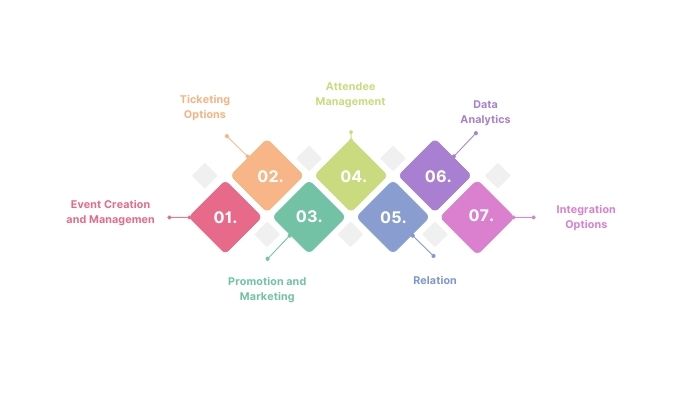
Before you go off with our own event app development, let’s look at the feature you see in eventbrite.
These are, as mentioned below:
Event Creation and Management: Intuitive event creation tools enable organizers to set up events, manage ticket types, and customize registration forms.
Ticketing Options: Eventbrite offers various ticket types (early bird, VIP, etc.) and pricing options to cater to different attendee segments.
Promotion and Marketing: Organizers can leverage built-in marketing tools to promote events through social media integration, email campaigns, and more.
Attendee Management: From registration and check-in to post-event communication, Eventbrite assists organizers in managing attendee engagement.
Payment Processing: Secure payment gateways facilitate seamless transactions and timely payouts for organizers.
Data Analytics: Eventbrite provides insights into attendee demographics, ticket sales, and other key event metrics.
Integration Options: Integration with third-party tools like CRM systems and marketing platforms enhances the overall event management experience.
Other Event Apps Like Eventbrite
Now, let’s look at some of the best event app development examples or what you wouldcall apps like eventbrite and then we shall see whether or not you should develop one.
· Meetup
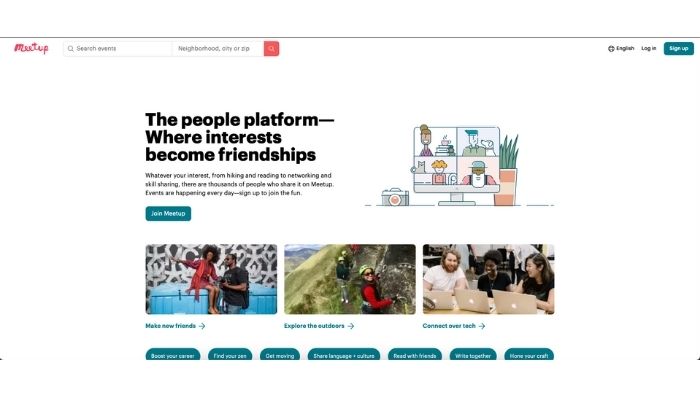
Meetup is a popular event platform that connects people with common interests.
It allows users to create and discover local events based on a wide range of topics, from technology and fitness to arts and hobbies.
You can join existing groups centered around your interests or create your own events for others to join.
Meetup’s focus on community engagement and face-to-face interactions makes it an excellent choice for networking and meeting like-minded individuals.
· Eventzilla
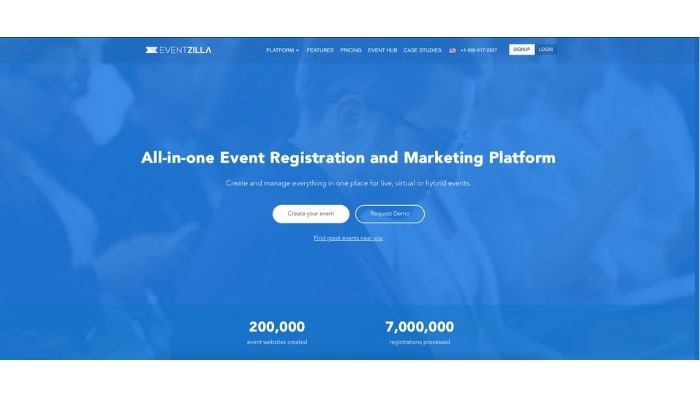
Eventzilla is a comprehensive event management platform that offers tools to help you plan, promote, and sell tickets for your events.
The platform provides customizable event pages, ticketing options, and integrated payment processing.
Moreover, it also supports features like discount codes, attendee tracking, and analytics to help you optimize your event’s success.
Eventzilla is known for its user-friendly interface and flexibility, making it suitable for a wide range of event types, including conferences, workshops, and social gatherings.
· Cvent
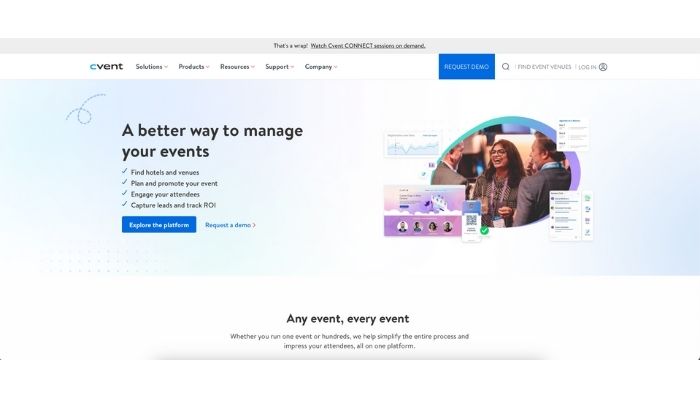
Cvent is a robust event management and registration platform designed for larger-scale events, conferences, and trade shows.
Cvent’s strengths lie in its advanced features such as session management, exhibitor management, and integration with other event-related software.
It’s a go-to choice for businesses and organizations that host complex and multifaceted events.
· Splash
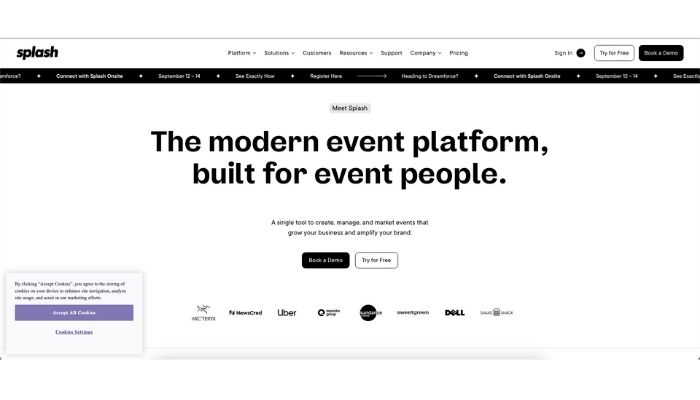
Splash is an event marketing and registration platform that emphasizes creating visually appealing event pages.
It offers a range of customization options for event branding and designs, helping you create a unique and engaging experience for potential attendees.
Splash also provides tools for guest list management, check-in, and post-event analytics.
· Bizzabo
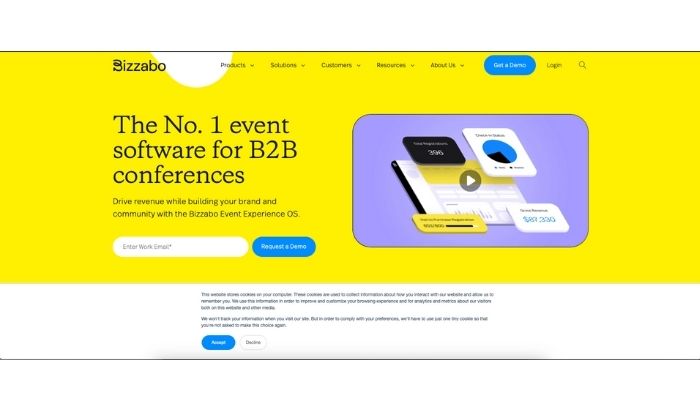
Bizzabo is a comprehensive event management solution tailored for conferences and corporate events.
Moreover, it provides features for attendee registration, event website creation, ticketing, and networking.
Bizzabo also focuses on enhancing the attendee experience through features like an event app, matchmaking, and interactive agenda planning.
Furthermore, its robust data analytics capabilities allow event organizers to gather insights and make data-driven decisions to improve future events.
Should You Go For Event App Development?
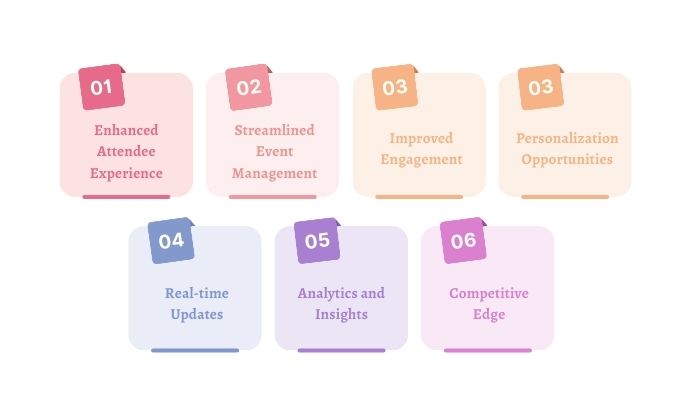
If you’re considering venturing into event app development, it could be a strategic move that offers numerous benefits for your business or project.
Enhanced Attendee Experience
Investing in event app development can greatly enhance the experience for attendees.
Through a well-crafted app, attendees can access crucial event details like schedules, speaker bios, venue maps, and real-time updates, all in one place.
Plus, this convenient access to information can significantly improve attendee satisfaction and contribute to a positive perception of your event.
Streamlined Event Management:
Creating an event app can streamline the management process for organizers. Tasks such as registration, ticketing, and communication can be automated through the app, saving both time and resources. This efficiency allows you to focus on delivering a seamless event rather than getting bogged down in administrative tasks.
Improved Engagement
An event app provides a platform for enhanced engagement. Attendees can interact with each other, share experiences, and provide feedback through the app. This not only creates a sense of community but also provides valuable insights that can be used to enhance future events.
Personalization Opportunities
Event apps enable personalized experiences.
Attendees can customize their schedules, bookmark sessions of interest, and receive tailored recommendations based on their preferences.
This level of personalization can make attendees feel valued and more likely to engage with your event content.
Real-time Updates
The real-time nature of event apps allows organizers to communicate important updates promptly.
Whether it’s a change in schedule, a surprise guest, or urgent announcements, attendees can receive the information instantly through the app, eliminating confusion and ensuring everyone is on the same page.
Analytics and Insights
Event apps provide valuable analytics and insights that can help you understand attendee behavior, preferences, and engagement patterns.
Furthermore, this data can be used to refine future events, making them even more tailored to your target audience.
Competitive Edge
In today’s digital age, having an event app can give you a competitive edge.
Attendees have come to expect seamless digital experiences, and providing an app can demonstrate your commitment to staying current and meeting their expectations.
Event App Development Process: Creating An App Like EventBrite
Creating an event app like Eventbrite involves a strategic development process to ensure its success. Here’s a step-by-step guide to help you embark on this journey:
1. Market Research
Begin by conducting thorough market research to understand your target audience, their preferences, pain points, and what they expect from an event app.
Identify the unique features that can set your app apart from competitors like Eventbrite.
2. Conceptualization and Planning
Based on your research, outline the key features and functionalities your app will offer.
Plan the user interface, user experience, and overall app flow.
Create a roadmap that includes design, development, testing, and launch phases.
3. Feature Development
Start building the core features of your event app.
These may include event discovery, ticket purchasing, event registration, personalized schedules, interactive maps, social sharing, and push notifications.
Moreover, ensure that the app is user-friendly and intuitive to navigate.
4. Design and User Interface
Craft an appealing and user-centric design for your app. Pay attention to color schemes, typography, and layout to create a visually engaging experience.
The design should align with your app’s branding and resonate with your target audience.
5. Backend Development
Develop the backend infrastructure that supports your app’s functionality.
This includes setting up databases, APIs, user authentication, payment gateways, and data storage. Security and scalability are crucial considerations during this phase.
6. Ticketing and Payment Integration
Integrate a secure and convenient payment system that supports various payment methods. This step is pivotal for handling ticket sales and ensuring a seamless user experience.
7. Testing and Quality Assurance
Thoroughly test your app across different devices, operating systems, and scenarios. Identify and fix any bugs, glitches, or usability issues.
Conduct both functional and usability testing to ensure a smooth user experience.
8. Launch and Marketing
Prepare a comprehensive launch strategy.
Create engaging promotional materials, such as videos, blog posts, and social media content.
In addition, leverage SEO techniques to optimize your app’s visibility on app stores. Encourage user reviews and ratings to build credibility.
9. Ongoing Maintenance
Continuously monitor the app’s performance, security, and compatibility with new devices and operating system updates.
Moreover, regularly release updates to ensure the app remains relevant and functional.
Cost To Develop An App Like EventBrite

The cost of app development can vary widely based on factors like:
- Features
- Complexity
- development team location
- and platform (iOS, Android, web).
A basic version might start at around $30,000, while more advanced versions could exceed $100,000.
For more detail on the same, you should contact mobile app development companies.
Common Mistakes To Avoid in Event App Development
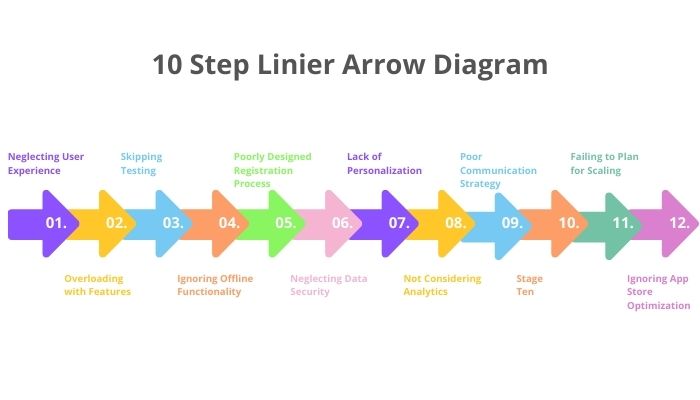
Now, before we end the blog, let’s look at few pitfals that you should avoid during event app development.
These are, as mentioned below:
Neglecting User Experience
Avoid the mistake of overlooking user experience. Your app should be intuitive, easy to navigate, and visually appealing.
Plus, keep user preferences in mind and ensure that every interaction with the app is smooth and enjoyable.
Overloading with Features
Don’t cram too many features into your app.
While it’s tempting to include everything, an overloaded app can confuse users and slow down performance.
And focus on providing essential features that enhance the event experience.
Skipping Testing
Don’t skip comprehensive testing.
Testing helps identify bugs, glitches, and usability issues before the app reaches users.
Thoroughly test your app across various devices, operating systems, and scenarios to ensure its functionality.
Ignoring Offline Functionality
Don’t overlook offline functionality.
Now, users might face connectivity issues during events, so your app should offer basic features even without an internet connection.
This prevents frustration and maintains usability.
Poorly Designed Registration Process
Avoid a complex and lengthy registration process. Keep it simple and minimize the steps required to register for an event.
Therefore, users are more likely to abandon the process if it’s cumbersome.
Neglecting Data Security
Ensure strong data security measures.
Neglecting security can lead to data breaches and damage to your app’s reputation. Implement encryption and authentication protocols to protect user information.
Lack of Personalization
Don’t create a one-size-fits-all app.
Personalization is key to engaging users. Allow them to customize their event schedules, receive relevant notifications, and tailor their experience based on preferences.
Not Considering Analytics
Avoid ignoring analytics.
Moreover, analytics provide insights into user behavior, helping you make informed decisions for app improvements.
Regularly analyze data to understand what works and what needs adjustment.
Poor Communication Strategy
Don’t forget to communicate effectively. Keep users informed about updates, changes, and important event details through push notifications or in-app messages.
Effective communication enhances user engagement.
Disregarding Feedback
Avoid disregarding user feedback. Users’ insights are invaluable for improving your app.
Listen to their suggestions, address concerns, and implement meaningful changes based on their input.
Failing to Plan for Scaling
Don’t overlook scalability. Your app should be able to handle increased usage as your user base grows.
Plan for scalability from the start to avoid performance issues down the road.
Ignoring App Store Optimization
App Store Optimization (ASO) is crucial.
Neglecting ASO can result in poor visibility on app stores. Optimize your app’s title, description, keywords, and visuals to improve its discoverability.
Conclusion
The journey of Eventbrite, from a startup to a global event management powerhouse, showcases the transformative impact of innovation, dedication, and user-centricity. Event app development, inspired by platforms like Eventbrite, offers opportunities to enrich event experiences, streamline management, and connect people. Careful planning and avoiding common pitfalls can pave the way for successful app ventures in this dynamic landscape.
FAQ
Eventbrite is an event management and ticketing platform founded in 2006 by Kevin Hartz, Julia Hartz, and Renaud Visage. It aimed to revolutionize event management and ticketing, offering a seamless way to discover, create, and manage events of all sizes.
Eventbrite generates revenue through service fees, payment processing fees, organizer fees for premium features, subscription plans, ticket insurance commissions, onsite solutions, advertising partnerships, and data analytics packages.
An event app like Eventbrite would offer features like event creation and management tools, various ticketing options, promotion and marketing tools, attendee management, secure payment processing, data analytics, integration options with third-party tools, and real-time updates.
Some other event apps similar to Eventbrite include Meetup, Eventzilla, Cvent, Splash, Bizzabo, and Brown Paper Tickets. Each of these platforms offers various features and focuses on different aspects of event management.
Developing an event app can enhance attendee experience, streamline event management for organizers, improve engagement, offer personalization opportunities, provide real-time updates, offer valuable analytics, and provide a competitive edge in the digital age.
The development process involves market research, conceptualization and planning, feature development, design and user interface creation, backend development, ticketing and payment integration, testing and quality assurance, launch and marketing, and ongoing maintenance.
The cost of development varies based on factors like features, complexity, platform, and development team location. A basic version might start at around $30,000, while more advanced versions could exceed $100,000.
Common mistakes include neglecting user experience, overloading with features, skipping testing, ignoring offline functionality, having a poorly designed registration process, neglecting data security, lacking personalization, not considering analytics, having a poor communication strategy, disregarding feedback, and failing to plan for scaling.
App Store Optimization is crucial to improve the discoverability of your app on app stores. Optimizing your app’s title, description, keywords, and visuals can lead to better visibility and increased downloads.



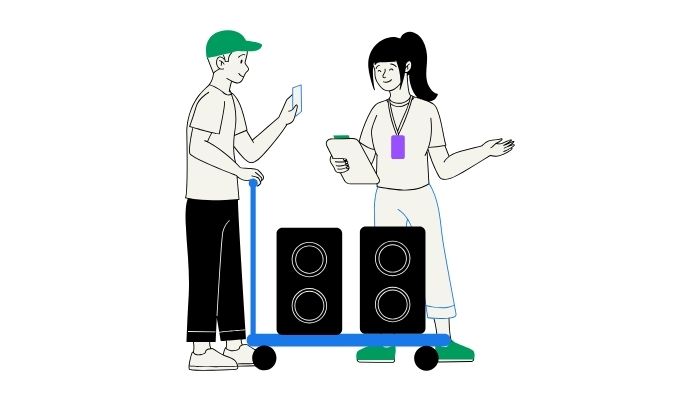


No Comments
Comments are closed.